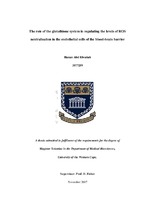| dc.contributor.advisor | Fisher, D. | |
| dc.contributor.author | Elwahab, Hanan Abd | |
| dc.date.accessioned | 2018-04-18T08:15:00Z | |
| dc.date.available | 2018-04-30T22:10:07Z | |
| dc.date.issued | 2017 | |
| dc.identifier.uri | http://hdl.handle.net/11394/5954 | |
| dc.description | Magister Scientiae - MSc (Medical BioSciences) | |
| dc.description.abstract | Brain endothelial cell types are frequently used as in vitro models to study the
blood-brain barrier (BBB). Oxidative stress (OS) has been reported numerous times
to cause BBB dysfunction which is crucial to the initiation and or propagation of
several neurologic disorders. Glutathione (GSH) plays a significant role in the defence against OS in the brain
endothelial cells. Therefore, the brain endothelial cell line bEnd.5 was profiled as
an endothelium model of the BBB because of its natural GSH content, and its
reactive oxygen species (ROS)-neutralising capacity in the presence and/or absence
of a modest concentration (25 ?M) of a standard antioxidant, Trolox. Fluorescent
microscopy with monochlorobimane (mBCl) as a fluorescent probe was used for
cellular GSH targeting. | |
| dc.language.iso | en | |
| dc.publisher | University of the Western Cape | |
| dc.title | The role of the glutathione system in regulating the levels of ROS
neutralisation in the endothelial cells of the blood-brain barrier | |
| dc.rights.holder | University of the Western Cape | |

